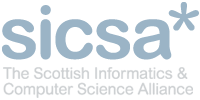Date/Time
Date(s) - 15/11/2012 - 16/11/2012
9:00 am - 11:00 am
Location
SHSC Conference & Training Centre, Edinburgh
Prof. Wyatt Newman, EECS Dept, Case Western Reserve University
SICSA Distinguished Visiting Fellow, Edinburgh University, Fall 2012
15 November, 2012, 9:00-9:50 and 10:00-10:50, Informatics Forum 4.31, U. Edinburgh
16 November, 2012, 11:00-12:00 and 1:00 to 2:00, Informatics Forum 4.31, U. Edinburgh
To register for this event please go to http://sicsamasterclassnewman.eventbrite.com
This short course will be comprised of a series of 4 lectures over 2 days, focusing on capabilities, limitations and algorithms for robots performing tasks that involve exchanging energy with the environment. Applications include: opening a door, grinding a workpiece, performing mechanical assembly, and performing surgery. Lecture 1 will lay the theoretical framework for analyzing feedback systems interacting with physical environments. The non-collocation problem will be introduced in the context of linear systems and passive physical-equivalent systems, establishing performance limitations on force control. Lecture 2 will interpret alternative force-control algorithms in the context of passive physical equivalents, leading to predictions of conditional contact stability and to the derivation of Natural Admittance Control. Lecture 3 covers issue of practical implementation of force control on robotic systems, including analysis of performance limitations for various user-interface constraints and exploitation of mechanical filtering. Lecture 4 reviews application programming using virtual attractors and an underlying compliant-motion controller. Application examples include mechanical assembly, grinding/deburring, and robotic surgery.
1) Impedance perspective on energically interacting systems
a. Impedance equivalent of linear systems with collocated sensors and drives
b. The non-collocation problem and limits to programmable inertia modulation
2) Impedance interpretation of force-control algorithms
a. Explicit force control
b. Accommodation control
c. Impedance control
d. Natural admittance control (NAC)
3) Compliant-motion control implementations with interface constraints
a. Direct-torque access
b. Velocity-control access
c. Position-control access
d. Mechanical filters
4) Higher-level programming of compliant-motion applications
a. Programming with virtual attractors
b. Learning assembly and manipulation strategies
c. Grinding/deburring
d. Robotic surgery
Refreshments and an informal reception will be held following the final session on Day 1. Lunch will be provided on Day 2.
About the instructor:
Wyatt Newman is a professor in the department of Electrical Engineering and Computer Science at Case Western Reserve University. His research is in the areas of mechatronics, robotics and computational intelligence, in which he has 12 patents and over 125 technical publications. He received the S.B. degree from Harvard College in Engineering Science, the S.M. degree in Mechanical Engineering from M.I.T. in thermal and fluid sciences, the M.S.E.E. degree from Columbia University in control theory and network theory, and the Ph.D. degree in Mechanical Engineering from M.I.T. in design and control. Dr. Newman spent 8 years in industrial research at Philips Laboratories, Briarcliff Manor, NY, engaged in electromechanical design and control. He joined Case in 1988, and in 1992 he was named an NSF Young Investigator in robotics, and subsequently was named a Herbold Fellow, a Tau Beta Pi “distinguished engineer”, a Woody-Flowers FIRST-robotics mentor awardee, and a CWRU awardee for teaching and for leadership. In 2007, he led “Team Case” in the DARPA Urban Challenge, involving autonomous vehicles operating among live and robotic traffic.
Prof. Newman, a registered professional engineer and a senior member of IEEE, also has held adjunct appointments at the Cleveland Clinic and the Cleveland V.A. Medical Center; was a visiting scientist at Philips Natuurkundig Laboratorium, Eindhoven, The Netherlands; visiting faculty at Sandia National Laboratories, Intelligent Systems and Robotics Center, Albuquerque, NM; a NASA summer faculty fellow at NASA Glenn Research Center; a visiting fellow in neuroscience at Princeton University; and is currently a distinguished visiting fellow at Edinburgh University.







